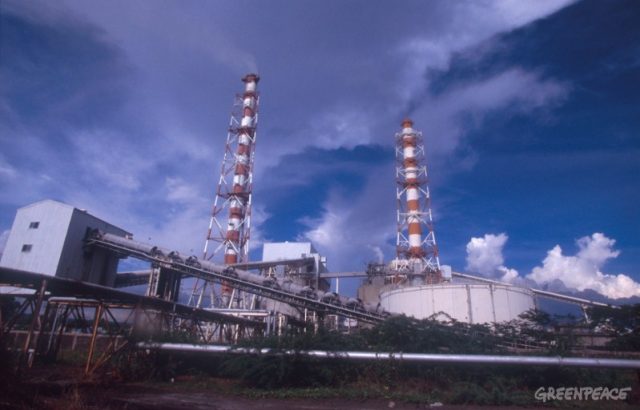MANILA, Philippines — The House of Representatives will stand firm against a provision increasing the tax on coal in the Tax Reform for Acceleration and Inclusion bill because this would increase power rates to the detriment of consumes, Speaker Pantaleon Alvarez said Thursday, December 7.
The Senate has approved a 3,000-percent increase in coal taxes to be collected in three tranches until 2020, which means the current P10 excise tax will be raised to P100 in 2018, P200 in 2019 and P300 by 2020.
No such tax is included in the House version of TRAIN.
The coal tax is among the contentious issues in the ongoing deliberations of the bicameral conference committee to harmonize the two versions of the bills.
“Hindi po namin papayagan ‘yan; definitely hindi (We will not allow it; definitely not),” Alvarez aid in a radio interview when asked for the stand of the House on the coal tax.
“Let us look at this objectively from the point of view of the consumers. Dahil pagka halimbawa pinatawan mo ng additional taxes itong coal-powered plants, ‘yung industry players maaaring hindi magre-reklamo ‘yan kasi ipa-pass on lang ‘yan doon sa consumers (Because for example you impose additional taxes on coal-fired power plants, the industry players may not complain because they will just pass these on to the consumers),” Alvarez said.
Alvarez said it did not need rocket science to know that an increase in electricity prices would create a ripple effect on the prices of goods and services.
“Ang tinitingnan natin dito ‘yung kapakanan ng consumers kasi mataas na ang kuryente natin, tayo ang isa sa mga pinakamataas sa Asia. Ngayon ang layunin nga natin dito paano natin pababain. Eh eto dadagdagan mo na naman ng buwis ‘yan eh ‘di tataas ‘yan,” he said.
(We are looking at the welfare of the consumers because our electricity is so expensive, we have one of the highest rates in Asia. Now our intention is to bring rates dow. But if you increase the tax the rates will go up.)
Alvarez said he has been in touch with Energy Secretary Alfonso Cusi to discuss ways of lowering power rates.
The House recently approved on third and final reading House Bill No. 1616 exempting the system loss charge component in the sale of electricity by distribution companies and electric cooperatives from the coverage of the value added tax.
System loss is the part of one’s electric bill representing the cost of electricity lost during transmission, pilferage, and due to technical and administrative inefficiency, which is passed on to the consumers. Under existing laws it is also subject to VAT, which further drives electricity bills up.
Aside from the expected hike in electricity rates, the coal tax would also hinder the growth of the country’s manufacturing sector, the Speaker said.
Alvarez also stressed that the Senate insertion of the tax coal tax in the TRAIN runs counter to the constitutional mandate that all revenue measures must originate exclusively from the House of Representatives.
He said the Senate may only “propose amendments or concur.”
But environmental group Greenpeace, which has been campaigning for scrapping coal fossil fuels in favor of renewable energy, said the hike in coal taxes should have been implemented a long time ago.
“Greenpeace supports this bold move by the Senate to stand by Filipinos who are long suffering from the impacts of coal and which decided that it’s time to stop coddling an industry that has caused so much destruction on our health and our country’s natural resources,” it said.
“The coal industry cannot continue amassing wealth at the expense of destroying our environment, our climate and our people. They have been benefiting from an outdated taxation policy that is biased for the promotion of coal and enjoying this unfair advantage against other sources of energy,” it added.










